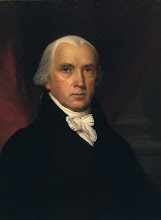Night of the Living Dead Bard
Welcome to the first in what I hope will be a year of William Shakespeare-related posts. (I say “hope” because it springs eternal on January 2, maybe less so when basketball games are on ESPN or when the weather gets warmer.) I am inside, safely sheltered from a 1 degree night and falling snow.
About a month ago, I decided to make an early resolution, and declared (via Facebook, so it’s out there for all to see) that I would read the complete works of Shakespeare in 2010, even the sonnets. It was one of my more popular posts, firing the imagination of at least four people. Ahem.
Those four people did, however, give me some good advice, one of whom suggested this very blog. Another of them hinted that a book deal awaits at the end of my journey, and perhaps HUNDREDS of dollars. So there you go.
But even so, the larger question remains: why? Why commit to such a goal as reading the entire works of the Bard?
The answer to that is, in a word, “zombies.”
For some time now I have been widely known as an aficionado of all things zombie: movies (especially), books, occasional comics, even desk toys. My fascination with them is at least partly academic; they are modern times’ most metaphorical monsters. I wrote an “A” paper on them for a grad school class, in which I convincingly made the case for zombies as the ideal post-colonial Marxist heroes.
But no matter the amount of legitimacy I strive to inject into my lifelong love of horror, when revealed it is nearly always met with a raised eyebrow at best or open scorn at worst. So reading Bill’s writings is a solid way to be more publicly respectable.
But my motivation goes deeper than that, and will, I hope, reap benefits of a more personal nature. I am a writer in three capacities: a corporate writer/editor for my career, a writer of critical papers as an English graduate student, and also as a hobby (which I hope soon to turn into an additional source of folding money, if not fame and the adoration of buxom females).
As a three-fold scribe, “voice” is an important consideration to me. The three writers I admire most – Raymond Chandler, William Goldman, and Robert R. McCammon – all have very distinctive voices, or styles. I can write in their styles in my sleep, and manage to inject a bit more pizzazz than average into my corporate writings, as well. Beyond that, it had been a while since I received anything but glowing praise for my prose (at least from anyone that I think knows what they’re talking about).
Until the class I took last semester: Publishing Non-Fiction. Not that my stories were castigated – far from it. I got an ‘A,’ and everybody who read them enjoyed them a lot. It’s just that the professor described the style I used as amusing, but straightforward and “reportive.” He said that my stories might not be a proper fit for some more poetic literary journals. It didn’t occur to me at the time that reportive isn’t a word; I was too busy being offended.
I thought my writing, humorous and pithy though it was, still maintained a certain lyricism where I intended it. It was a subtle slap in the face. Maybe the slap was even nonexistent. Yet I perceived it all the same, and the next day, I resolved to immerse myself in something besides apocalyptic horror, dark fantasy or period mystery.
Since I don’t enjoy poetry per se (my worst graduate paper so far has been a new critical examination of Robert Frost’s The Building Wall*), I thought immediately of Shakespeare. And the rest is … admittedly recent history.
I have not really pondered much the order in which I will read the works. People asked, and all along I said I would read them in the order they appear in the old, cracked faux leather collection I have had since my grandparents left me when they passed. I have not pondered much. I have not plotted out the number of pages I need to read per day or any of that. I’ll just feel it out.
Au revoir. Snow falls on my driveway, and near my recliner The Tempest awaits.
* I think the best kind of poetry generally includes the word “Nantucket.”
Tuesday, January 5, 2010
Subscribe to:
Post Comments (Atom)

No comments:
Post a Comment